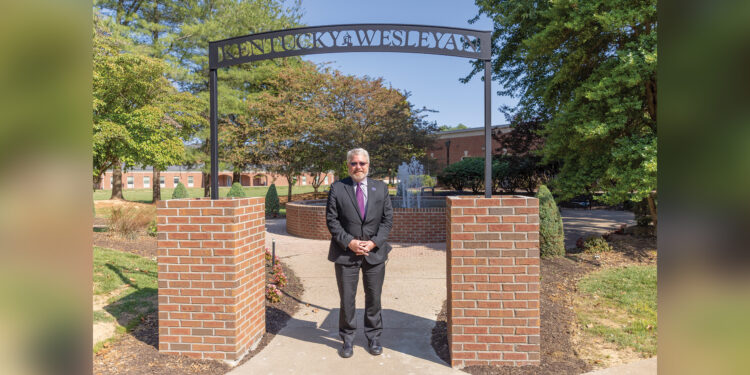Kentucky Wesleyan College
Photos by Jamie Plain
Dr. Thomas Mitzel became president of Kentucky Wesleyan College in January of 2020. Then the pandemic began, and Mitzel had to pivot a school into the unknown.
Students were kept at the college as long as they could because he thought it was the safest place for them, since they had already been living together in pods. When the mandate came to send students home, Mitzel, the KWC community and the board of trustees used the time to plan and consider what they really wanted.
Those entrusted with ensuring a quality education for the students whittled it down to three main areas, and named them The Three Pillars, based on the three Corinthian columns seen in Hocker-Hall Grove that were originally part of the Winchester administration building. These pillars can also be seen from the President’s home.
The Three Pillars provide strategies for the college’s future in academic innovation and investment, building for the future and a commitment to affordability and excellence.
“It builds on the foundation of the past, like the pillars,” Mitzel said.
When students returned to campus, the main goal was to get back to normalcy.
“We were trying to get students to reengage, and the student life office really got students out,” he said. “We got back to normal, and students came back gregarious and wonderful.”
Mitzel’s investment in culture comes from his deep-rooted love for education. His older brother was the first in the family to graduate college, and for Mitzel, it was no easy feat.
The family did not have much money, and when his parents divorced, he knew that education was the only way to succeed and break the cycle.
“I learned to live on nothing,” he said.
It was not without struggle, as Mitzel is quick to point out, but his general chemistry advisor found him and looked at his daily schedule. Mitzel had been a track and cross country runner and got a scholarship, so he was spending early morning hours running, then attending class and necessary labs, an afternoon workout, working for six hours and then studying until the early morning hours.
“As soon as he found out why I was so behind and I realized what I needed to do, my grades went up,” he said.
Mitzel was forced to take a year off to work, and he was so driven by the fact that it took extra time for him to finish his undergraduate studies that he wanted to complete graduate school in less time.
“It usually takes seven-and-a-half to eight years, but I was out in four,” he said. “It was fun.”
Mitzel worked at several colleges during post-graduate work in organic chemistry. He enjoyed having undergraduates be part of his research. In fact, he said, all were published researchers under him.
His view on administration was that it was good for one thing only – providing the resources needed to teach at that level.
When doing post-graduate work at Trinity College in Connecticut, he enjoyed the small campus life.
“You learn and meet the others,” he said. “You know everyone across the disciplines.”
At Trinity, he was asked to complete a three-year rotating deanship. He agreed but said he didn’t want all three to be academic. So, one of the years was financial. He also had the stipulation that he was allowed to keep his research lab and teach one class at night.
“I joked that I was admin during the day and a chemist at night,” he said.
He took a job at St. Andrews University in Austin, Texas, where he established a five-year plan, learned how to fundraise and how to interact with donors.
When Trinity College called two years later asking him to step in as provost, he felt he owed them for taking a chance on him earlier, so he returned for three years before taking a job as president of Dickinson State University in North Dakota.
Mitzel said that he enjoys finding solutions to problems and helping people in administrative positions, especially at small colleges, like KWC.
“The history and mission and passion of [Owensboro] are amazing, and I am awed by the passion of the community for the college,” he said. “I am duly impressed by the arts and entertainment for a town this size.”
While many administrators see technology as something that engulfs what came before, Mitzel does not think that traditional education will be eliminated. He cites examples of those who went to listen to Greek philosophers because there were no books, but when books were created, people could read it over again and write in margins to expand their education while still listening to the greats. It did not go away, he said.
“It’s not going anywhere,” he said. “Every time we get new technology, we have to integrate it to make education better. We can do Zoom, hybrid and online well, but people still want to come in person.”
In student surveys at KWC, only 25% said coursework was why they attended. Learning how to live alone and in communities, athletics and the support system of the college help students navigate as adults.
“You can still fail,” he said. “You need to push hard enough to fail.”
And that’s when the support kicks in, which is where Mitzel does his best work. While he would like to see an increase in students, he doesn’t want to lose the essence of Kentucky Wesleyan College.
“I want to know every student,” he said. “That’s what we do – and those before me did, as well.”
As for Mitzel’s style of leadership, he said he takes it from advice given to him by someone at Trinity College – surround yourself with people better than you and let them do their job.










